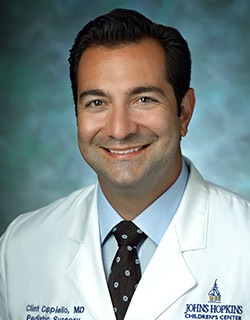What Parents Should Know About Pediatric Surgery
September 27, 2019Few things are more stressful than learning that your child needs surgery. Eric Jelin, MD, and Clint Cappiello, MD, pediatric surgeons at GBMC and Johns Hopkins, talked with Mary Beth Marsden about the type of surgeries they perform, innovations in minimally invasive pediatric surgery, and how they provide care focused on the whole family.
“We operate on more body parts than adult surgeons do,” explained Dr. Jelin. “They tend to be more specialized, but we handle a much wider range of types of surgeries, including surgeries on the chest and abdomen and surgeries for trauma and burns. We take care of the child from head to toe, with the exception of the heart, brain, and bones.”
Training for pediatric surgeons is extensive. They first complete adult general surgery training then do a two-year pediatric surgery fellowship during which they perform about 1,500 to 2,000 surgeries. During their careers they will operate on patients ranging from one-pound newborns to adult-sized teens and even perform some surgeries on babies who are still in utero.
“Our work is very collaborative,” said Dr. Cappiello. “We draw in doctors from multiple medical fields and pool our experience to provide the best possible care for our patients by combining our expertise. It’s an incredible responsibility that comes with incredible rewards.”
New technology has made it possible to perform many types of pediatric surgery minimally invasively, including hernia repairs, gastrointestinal surgery, and surgery to repair the esophagus when it hasn’t developed properly before birth. “We continue to work to make complex operations less invasive, which can help patients recover more quickly, in many cases without a scar,” said Dr. Cappiello.
Because Dr. Jelin, Dr. Cappiello, and their partners practice at both Johns Hopkins and GBMC, their patients have access to the full range of pediatric surgical care. If a surgery requires the resources of an academic medical center, they can transfer their patients to Johns Hopkins with just a phone call.
“We understand that we are meeting our patients’ families on the worst day of their lives,” said Dr. Cappiello. “Through the care, communication, and support we provide for patients and their families, we try to make their life a little better at a difficult time.”



